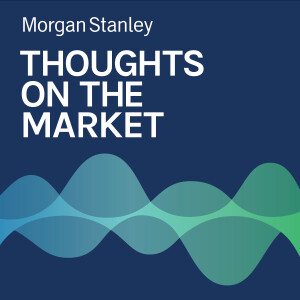
Michael Zezas: The U.S. Election, Clean Energy and Healthcare
 2023-12-13
2023-12-13
Investors are concerned about the potential impact of the upcoming U.S. presidential election in a number of sectors. Here’s what to watch.
----- Transcript -----
Welcome to the Thoughts on the Market. I'm Michael Zezas, Global Head of Fixed Income and Thematic Research from Morgan Stanley. Along with my colleagues, bringing you a variety of perspectives, I'll be talking about the impact of the U.S. elections on markets. It's Wednesday, December 13th at 10 a.m. in New York.
Following our publication last week of our early look for investors at the U.S. election, we've had plenty of discussion with clients trying to sort out what the event might mean for markets. Here's the three most frequently asked questions we've received and of course, our answers.
First, could the election be a catalyst to undo planned investment into the clean energy industry? This question often gets asked as, under what conditions could the Inflation Reduction Act be repealed? That Act allocated substantial sums to investment in clean energy alternatives, a boon for the industry. In our view, we don't see that act being repealed, even if Republicans who oppose the act take control of both Congress and the White House. We think there's too many negative local economic consequences to undoing that investment, to get a sufficient number of Republicans to vote for the repeal. However, clean energy investors should note that a Republican administration might be able to slow the spend of that money using the regulatory process.
Second, should healthcare investors be concerned that there's an election outcome that could substantially change the U.S. healthcare system? This was a concern in prior elections where Republicans promised to repeal the Affordable Care Act, an outcome current President Trump has recommitted to in his current campaign. Republicans couldn't make good on that promise, despite unified government control in 2017 and 2018. And here we think history would repeat itself with even a Republican majority having difficulty finding sufficient votes if it means restricting health care delivery to some of their voters. That said, investors in sectors that would be negatively impacted by a repeal of the Affordable Care Act could see market effects if Republicans start surging in the polls, as markets would then have to account for the possibility, albeit modest, of repeal.
Finally, when might political campaigns begin impacting markets? We don't have a clear answer here. In 2016 and 2020, health care stocks started reflecting campaign statements early in the year. Whereas macro market effects, such as the sensitivity of the Mexican peso to then candidate Trump's comments around renegotiating trade agreements, didn't kick in until much closer to November. The bottom line is that we don't really know, which is why we're here to help you prepare now.
Thanks for listening. If you enjoy the show, please share Thoughts on the Market with a friend or colleague, or leave us a review on Apple Podcasts. It helps more people find the show.
More Episodes
 2024-06-20
2024-06-20
 2024-06-18
2024-06-18
 2024-06-17
2024-06-17
 2024-06-14
2024-06-14
 2024-06-12
2024-06-12
 2024-06-10
2024-06-10
 2024-06-07
2024-06-07
 2024-06-06
2024-06-06
 2024-06-04
2024-06-04
 2024-06-03
2024-06-03
 2024-05-31
2024-05-31
 2024-05-29
2024-05-29
 2024-05-24
2024-05-24
Create your
podcast in
minutes
- Full-featured podcast site
- Unlimited storage and bandwidth
- Comprehensive podcast stats
- Distribute to Apple Podcasts, Spotify, and more
- Make money with your podcast
It is Free
- Privacy Policy
- Cookie Policy
- Terms of Use
- Consent Preferences
- Copyright © 2015-2024 Podbean.com




